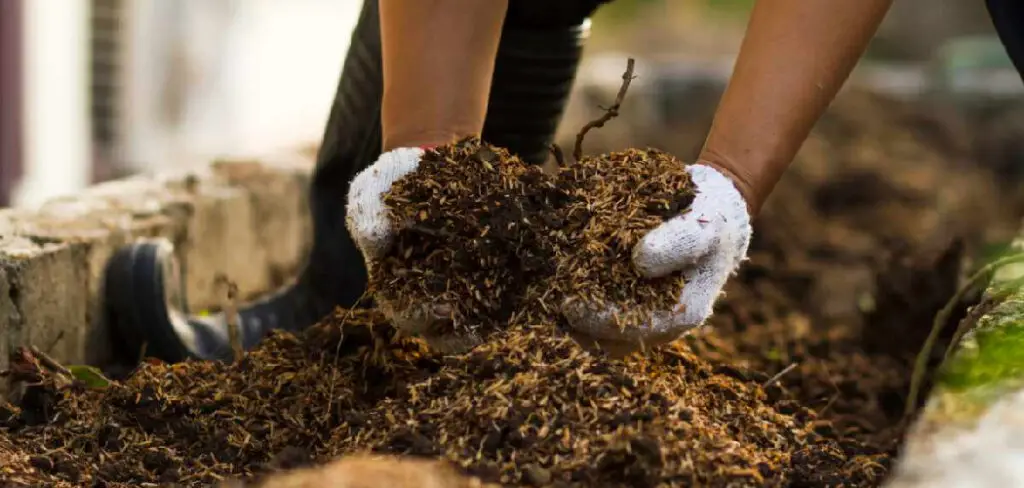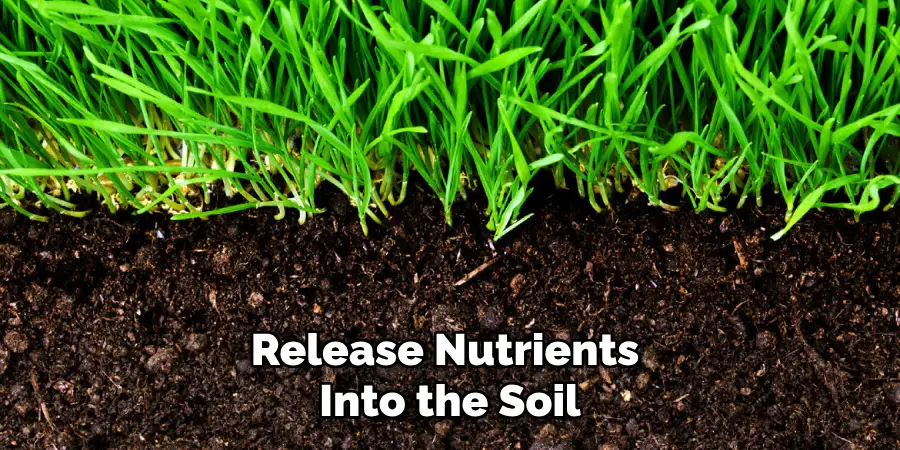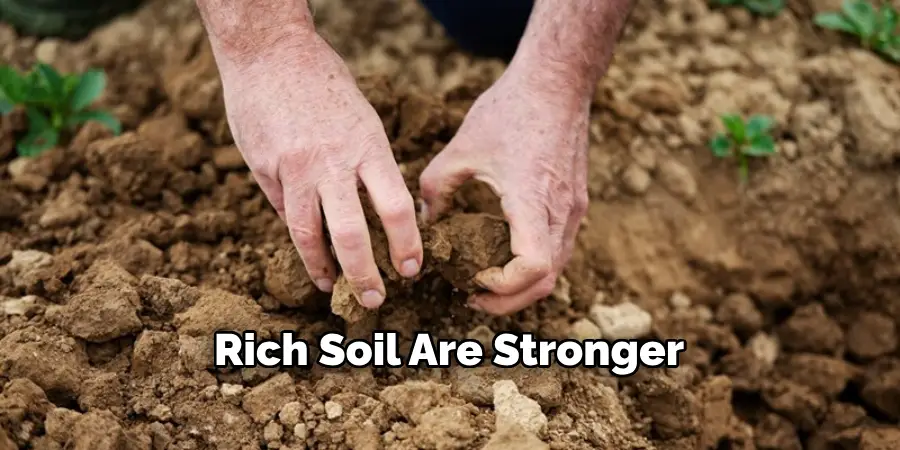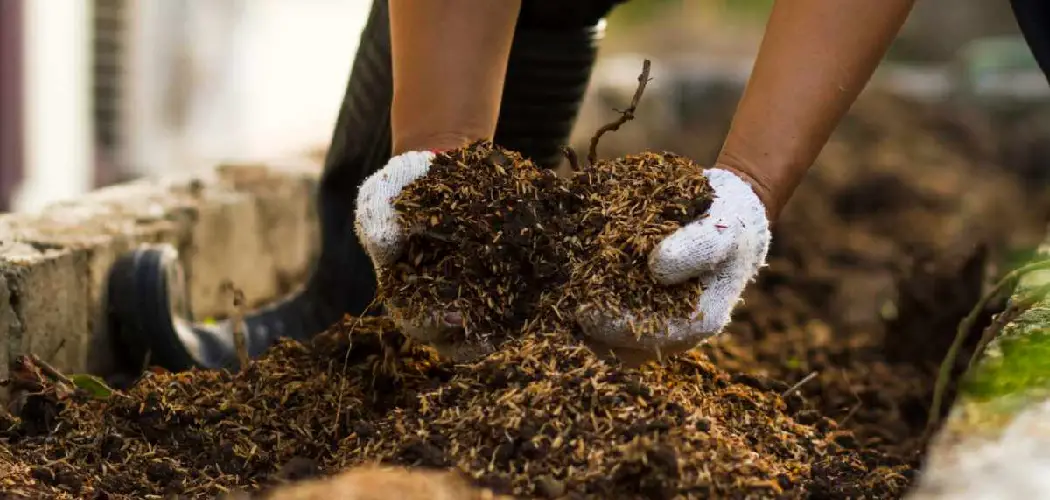Are you looking for a way to freshen up your lawn and achieve a lush, green look without using harsh chemicals or fertilizers that can damage the environment? Adding organic matter to your lawn is an effective, eco-friendly solution for boosting growth and nourishing soil. In this blog post, we will cover everything you need to know about how to add organic matter to lawn!

If you’re looking for ways to improve the look and health of your lawn, organic matter is a great place to start. Adding organic matter allows essential nutrients and beneficial organisms to be returned to the soil, promotes plant growth, improves water retention, enhances drainage capabilities and helps break down thatch – all vital factors in maintaining a lush and vibrant lawn.
Here we’ll discuss how exactly you can add organic matter to your lawn effectively so that it looks its very best. With just a few simple steps, you’ll have an immaculate outdoor space that’s sure to turn heads!
Why May You Want to Add Organic Matter to Lawn?
1 . To Improve Soil Structure and Drainage
Organic matter has the ability to help improve soil structure by breaking up clay and compacted soils. This in turn allows for better drainage, oxygenation of roots, and root growth. Adding organic matter can also increase water-holding capacity and reduce nutrient loss from leaching.
2 . To Provide Essential Nutrients
Organic matter is a source of essential nutrients such as nitrogen, potassium, and phosphorus. These nutrients are often lacking in lawns and are needed for healthy growth. Organic matter also contains micronutrients that may not be found in synthetic fertilizers.
3 . To Promote Microbial Activity
Organic matter is a food source for beneficial microorganisms that live in the soil. These organisms help decompose organic matter and release nutrients into the soil, making them available for plants to use. These microorganisms also improve soil health and can suppress disease-causing pathogens.

4 . To Increase Earthworm Populations
Earthworms are important indicators of healthy soil. They help break down organic matter and create channels in the soil for air and water flow. By adding organic matter to your lawn, you can attract earthworms and increase their populations, which in turn will further improve soil health.
5 . To Reduce the Need for Synthetic Fertilizers
Using organic matter as a fertilizer can reduce the need for synthetic fertilizers. This is because organic matter releases nutrients slowly over time, providing a steady source of nutrition for plants. It also helps prevent nutrient buildup and runoff, which can be harmful to the environment.
6 . To Encourage a Greener and Thicker Lawn
Organic matter acts as a natural soil conditioner, providing a stable environment for plant roots to grow in. This results in stronger and healthier root systems, which leads to a greener and thicker lawn. Organic matter also helps to retain moisture, reducing the need for frequent watering.
7 . To Reduce Soil Erosion
Adding organic matter to your lawn can help prevent soil erosion. The roots of plants grown in organic-rich soil are stronger and more extensive, holding the soil in place. Organic matter also improves soil structure, making it less prone to erosion from wind and water.

How to Add Organic Matter to Lawn in 5 Easy Steps
Step 1: Determine the Type of Organic Matter Needed
Before adding organic matter to your lawn, it is important to determine the type of organic matter that best suits your specific lawn needs. Different types of organic matter include compost, grass clippings, shredded leaves, and manure.
Each has its own unique benefits for improving soil health and promoting healthy lawn growth. For example, compost is a great all-around organic matter that adds nutrients and improves soil structure, while shredded leaves are ideal for increasing water retention in sandy soils.
Step 2: Gather Organic Matter Sources
Once you have determined the type of organic matter needed for your lawn, it’s time to gather your sources. Some homeowners choose to purchase pre-made compost or manure from garden centers, while others prefer to make their own compost using kitchen scraps or grass clippings. Whatever you choose, it’s important to have enough organic matter to cover your entire lawn area.
Step 3: Spread Organic Matter Evenly
To achieve the best results, it’s important to spread your chosen organic matter evenly across your lawn. This can be done using a rake or a spreader, depending on the size of your lawn. Make sure to cover all areas of your lawn and aim for a depth of about ¼-½ inch.
Step 4: Water Thoroughly
After spreading organic matter, it’s important to water your lawn thoroughly. This will help the organic matter settle into the soil and provide the necessary moisture for proper decomposition. It’s best to water deeply and infrequently rather than frequently with shallow watering.
Step 5: Repeat Process as Needed
Adding organic matter to your lawn is not a one-time process. It’s important to repeat the steps outlined above every few months, depending on the type of organic matter used and the specific needs of your lawn. This will help maintain healthy soil and promote lush, green growth in your lawn.
By following these easy steps,
you can add organic matter to your lawn and reap the benefits of a healthy and beautiful outdoor space. So, it is important to regularly monitor the health of your lawn and adjust your organic matter application schedule as needed.
Some Extra Tips to Add Organic Matter to Lawn
1 . Compost is the Key

Composting is one of the most affordable and easy ways to add organic matter to your lawn. You can create a composting bin in your backyard or buy ready-made compost from a gardening store. Also, you can use grass clippings, fallen leaves, and kitchen scraps to make compost. It not only adds organic matter but also acts as a natural fertilizer for your lawn.
2 . Mulch is Magic
Mulching is another great way to add organic matter to your lawn. You can use shredded bark, pine needles, or even shredded newspaper as mulch. Mulch helps to retain moisture in the soil, prevents weed growth, and also adds nutrients to your lawn as it decomposes.
3 . Use Organic Lawn Fertilizers
Instead of using chemical fertilizers, opt for organic lawn fertilizers that are made from natural materials such as composted manure or seaweed. These fertilizers not only add organic matter to your lawn but also improve the overall health of the soil.
4 . Consider Overseeding
Overseeding is a process where you spread grass seeds over an existing lawn. This not only thickens the turf but also introduces new organic matter into the soil as the old grass dies and decomposes. Additionally, overseeding helps to fill in bare spots and improves the overall appearance of your lawn.
5 . Avoid Over-Tilling
While tilling the soil can help to incorporate organic matter, over-tilling can have negative effects on your lawn. It can disrupt the delicate balance of microorganisms in the soil and also cause damage to the grassroots. So, it is best to avoid over-tilling and only do so when necessary.
Frequently Asked Questions
What Precautions Should I Take While Adding Organic Matter To My Lawn?
While adding organic matter to your lawn, make sure you wear gloves and a facemask. This will protect your hands and face from any type of chemical reaction or dust that may cause irritation. You should also use tools like shovels or rakes to handle the organic matter, instead of using your bare hands. Additionally, it is important to follow the instructions on the packaging of the organic matter and not mix it with any other chemicals or fertilizers.

How Often Should I Add Organic Matter To My Lawn?
The frequency of adding organic matter to your lawn depends on the condition of your lawn and soil. Ideally, you should add organic matter at least once a year in early spring or fall.
However, if your lawn is in poor condition or the soil is compacted, you may need to add organic matter more frequently. It is important to monitor the health of your lawn and adjust the frequency of adding organic matter accordingly.
Can I Use Any Type Of Organic Matter On My Lawn?
No, it is important to choose the right type of organic matter for your lawn. Some organic matter, such as compost or well-rotted manure, are great for improving soil health and adding nutrients to your lawn.
However, other types of organic matter, like sawdust or fresh grass clippings, can actually harm your lawn by depleting nitrogen from the soil. It is important to do research and choose a suitable type of organic matter for your lawn.
How Will Adding Organic Matter Benefit My Lawn?
Adding organic matter to your lawn has many benefits. It helps improve soil structure, making it easier for roots to grow and access nutrients. It also increases the water-holding capacity of the soil, reducing the need for frequent watering.
Organic matter also adds essential nutrients to the soil, promoting healthy plant growth. Additionally, it can attract beneficial organisms like earthworms that help aerate the soil and break down organic matter into nutrients for your lawn.
Conclusion
In conclusion, adding organic matter to your lawn is a great way to improve your soil and overall health of your lawn. The benefits of adding organic matter are numerous and include improved soil structure, higher water retention, improved fertility, and more. Taking the time to add organic matter is an investment in the health and beauty of your lawn for years to come.
Now you know how to add organic matter to lawn! With some dedication and persistence, you will begin seeing remarkable changes in your lawn’s health in no time! So get out there today with confidence and start jumping into action to achieve that lush-looking green lawn you have been dreaming about!
About
Outdoor Fixes is a distinguished figure in the world of Diy design, with a decade of expertise creating innovative and sustainable Diy solutions.
His professional focus lies in merging traditional craftsmanship with modern manufacturing techniques,
fostering designs that are both practical and environmentally conscious. As the author of diy,
outdoorfixes delves into the art and science of outdoorfixes-making, inspiring artisans and industry professionals alike.
Education RMIT University
(Melbourne, Australia) Associate Degree in Design (Outdoor Fixes) Focus on sustainable design, industry-driven projects,
and practical craftsmanship. Gained hands-on experience with traditional and digital manufacturing tools, such as CAD and CNC software.
Nottingham Trent University
(United Kingdom) Bachelor’s in outdoorfixes.com and Product Design (Honors) Specialized in product design with a focus on blending creativity with production
techniques. Participated in industry projects, working with companies like John Lewis and Vitsoe to gain real-world insights.
Publications and Impact
In diy, Outdoor Fixes his insights on indoor design processes, materials, and strategies for efficient production.
His writing bridges the gap between artisan knowledge and modern industry needs, making it a must-read for both budding designers and seasoned professionals.

